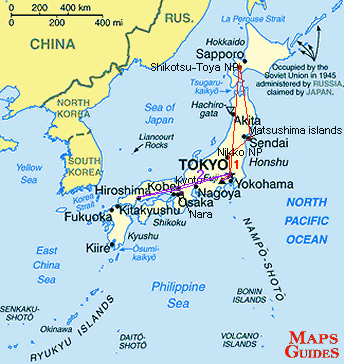Japan (日本 Nihon or Nippon, officially 日本国 Nippon-koku or Nihon-koku) is an island country in East Asia. Located in the Pacific Ocean, it lies to the east of China, Korea and Russia, stretching from the Sea of Okhotsk in the north to the East China Sea in the south. The characters that make up Japan's name mean "sun-origin", which is why Japan is sometimes identified as the "Land of the Rising Sun". Japan comprises over 3,000 islands making it an archipelago. The largest islands are Honshū, Hokkaidō, Kyūshū and Shikoku, together accounting for 97% of Japan's land area. Most of the islands are mountainous, many volcanic; for example, Japan’s highest peak, Mount Fuji, is a volcano. Japan has the world's tenth largest population, with about 128 million people. The Greater Tokyo Area, which includes the de facto capital city of Tokyo and several surrounding prefectures, is the largest metropolitan area in the world, with over 30 million residents. Archaeological research indicates that people were living on the islands of Japan as early as the Upper Paleolithic period. The first written mention of Japan begins with brief appearances in Chinese history texts from the first century AD. Influence from the outside world followed by long periods of isolation has characterized Japan's history. Since adopting its constitution in 1947, Japan has maintained a unitary constitutional monarchy with an emperor and an elected parliament, the Diet. A major economic power, Japan has the world's second largest economy by nominal GDP. It is a member of the United Nations, G8, G4, OECD and APEC, with the world's fifth largest defense budget. It is also the world's fourth largest exporter and sixth largest importer and a world leader in technology and machinery.
WikipediaIn 1603, a Tokugawa shogunate (military dictatorship) ushered in a long period of isolation from foreign influence in order to secure its power. For more than two centuries this policy enabled Japan to enjoy stability and a flowering of its indigenous culture. Following the Treaty of Kanagawa with the US in 1854, Japan opened its ports and began to intensively modernize and industrialize. During the late 19th and early 20th centuries, Japan became a regional power that was able to defeat the forces of both China and Russia. It occupied Korea, Formosa (Taiwan), and southern Sakhalin Island. In 1931-32 Japan occupied Manchuria, and in 1937 it launched a full-scale invasion of China. Japan attacked US forces in 1941 - triggering America's entry into World War II - and soon occupied much of East and Southeast Asia. After its defeat in World War II, Japan recovered to become an economic power and a staunch ally of the US. While the emperor retains his throne as a symbol of national unity, elected politicians - with heavy input from bureaucrats and business executives - wield actual decisionmaking power. The economy experienced a major slowdown starting in the 1990s following three decades of unprecedented growth, but Japan still remains a major economic power, both in Asia and globally.
CIA The World Factbook 




